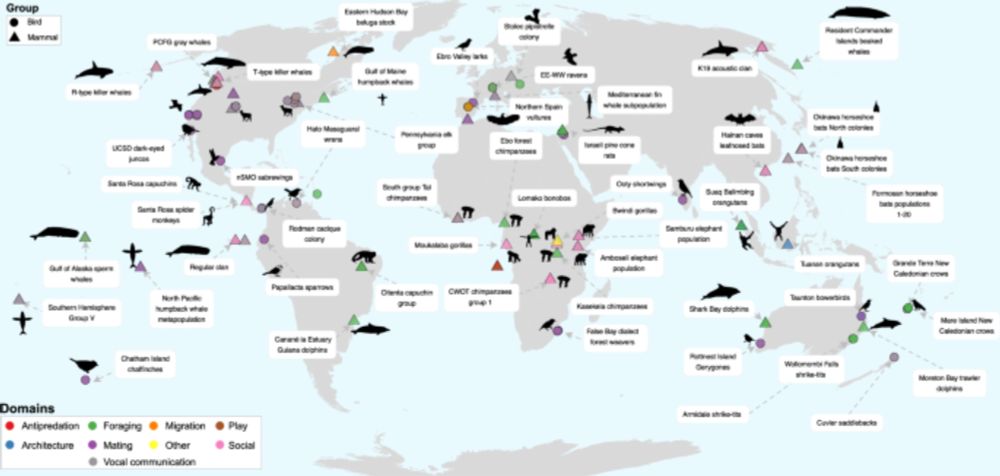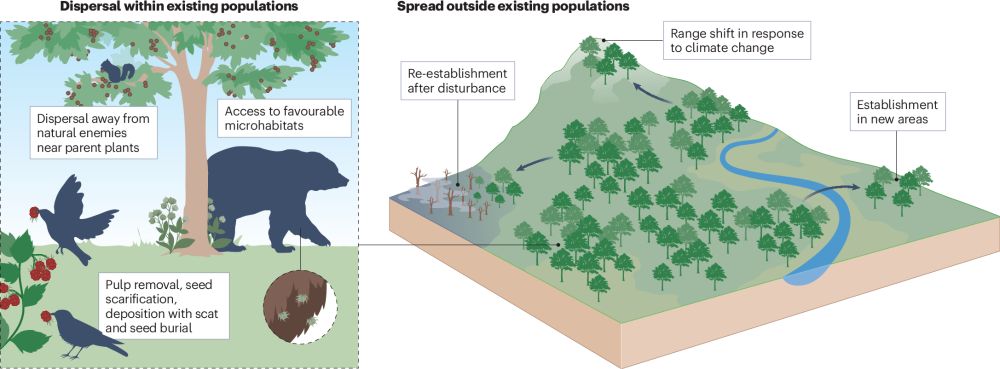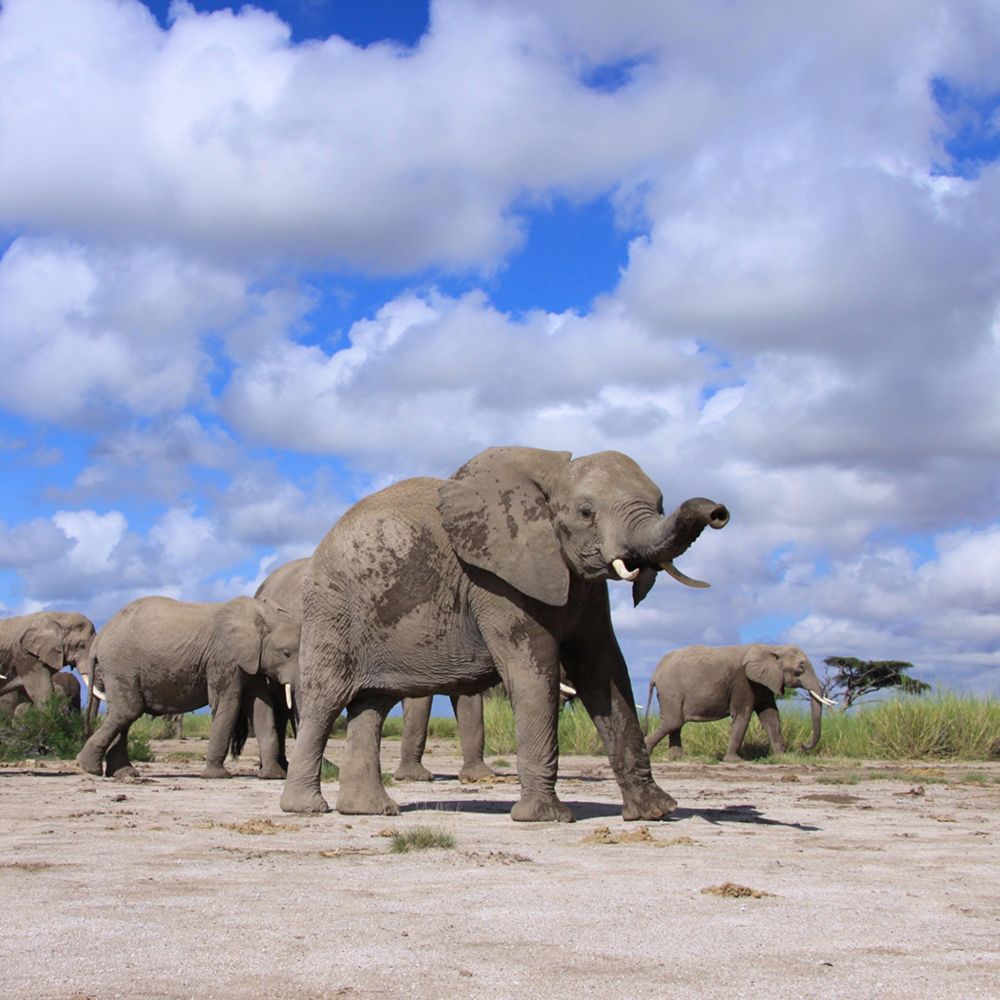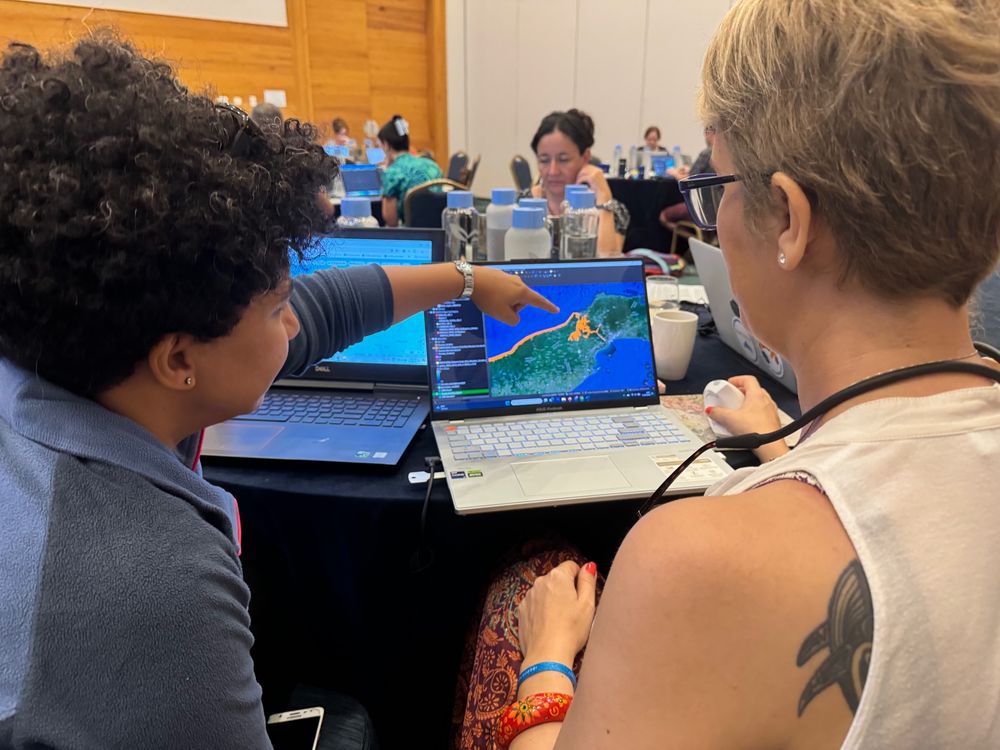Starlet is a goodie. I’m also a big fan of India!
12.08.2025 01:25 — 👍 1 🔁 0 💬 1 📌 0Madison Miketa
@madisonmiketa.bsky.social
Behavioral ecologist focused on: • Wild animal welfare science • Underwater noise + cetaceans • Animal culture (she/her)
@madisonmiketa.bsky.social
Behavioral ecologist focused on: • Wild animal welfare science • Underwater noise + cetaceans • Animal culture (she/her)
Starlet is a goodie. I’m also a big fan of India!
12.08.2025 01:25 — 👍 1 🔁 0 💬 1 📌 0
Proposed amendments to the Marine Mammal Protection Act would cut down protections to whales, dolphins, polar bears and other species
06.08.2025 17:57 — 👍 52 🔁 31 💬 1 📌 6
Killer whales work together to make nifty exfoliating scratchers out of kelp.
This is the first time tool use has been documented for grooming in cetaceans; it's probably also the first time a tool is made that benefits two animals simultaneously.
🧪🐋
www.cell.com/current-biol...

Happy to share our new paper introducing the Animal Culture Database in Scientific Data: We’re putting together a resource consolidating primary research on cultural behaviors in wild animal populations and how they’re affected by human activity (1/5) www.nature.com/articles/s41...
22.06.2025 23:16 — 👍 193 🔁 84 💬 3 📌 2
Humpback whale masked frequency-dependent hearing measured in environmental noise reveals their hearing range overlaps with anatomical predictions but extends to higher frequencies, with implications for assessing noise impacts on marine mammals
www.nature.com/articles/s42...

Exciting news from #UNOC2025! The High Ambition Coalition for a Quiet Ocean, led by Panama and Canada with 35 countries joining them, will work towards practical and ambitious solutions to reduce underwater noise and restore a quieter, healthier ocean: foraquietocean.org
11.06.2025 14:30 — 👍 2 🔁 0 💬 0 📌 0
New paper in @asab.org !
With both social & diffusion models, we assess the role of social transmission in the acquisition of depredation by social units of killer whales, as well as the extent to which social units engaged in this behaviour once acquired.
www.sciencedirect.com/science/arti...

Pollinator decline has captured global attention, but another plant-animal mutualism is quietly unraveling.
Our new Nature Reviews Biodiversity article synthesizes global evidence on seed disperser decline and what it means for plant biodiversity, ecosystem recovery, and climate adaptation. 🧵

New paper on the contributions of different marine sectors to underwater noise pollution within endangered Southern Resident killer whale habitat, highlighting potential impacts of vessel activity on acoustic habitat quality #SRKW
www.sciencedirect.com/science/arti...

New theme issue in Phil. Trans. R. Soc. B @royalsocietypublishing.org:
Animal culture: conservation in a changing world
Edited by @pbrakes.bsky.social, @lucymaplin.bsky.social, @emma-carroll.bsky.social, Alison L Greggor, Andrew Whiten and @ellengarland.bsky.social
doi.org/10.1098/rstb...

Scientists-- Please sign onto this open letter from scientists in defense of habitat protections under the Endangered Species Act. The comment period for the proposed regulation intended to diminish habitat protections closes on May 19. Any scientist is welcome to sign on. Thanks for sharing.
06.05.2025 18:29 — 👍 28 🔁 24 💬 0 📌 0
phys.org/news/2025-05...
Unravelling some of the complexity of animal cultures & conservation with @lucymaplin.bsky.social,
@emma-carroll.bsky.social, Alison L Greggor, Andrew Whiten, @ellengarland.bsky.social & contributors to our theme issue
doi.org/10.1098/rstb... @royalsocietypublishing.org

New paper:
Network indicators of cultural resilience to anthropogenic removals in animal societies
comparative analysis with data from @amboselibaboonrp.bsky.social, @sb-dolphins.bsky.social and the Samburu Elephant Project
doi.org/10.1098/rstb.2024.0144

New paper:
Culture and conservation in baleen whales
@ellengarland.bsky.social, @petercorkeron.bsky.social, Mike Noad, Briana Abrahms, @jennyallen13.bsky.social, @rconstantine.bsky.social, @lrendell.bsky.social, Renata Sousa-Lima, Kate Stafford, @emma-carroll.bsky.social
doi.org/10.1098/rstb...

A colleague at Stanford’s business school used The Stanford Daily to argue—poorly—against DEI. The piece was riddled with historical errors and left one searching for fact, so I broke my public writing hiatus to respond.
I hope you’ll read and share the piece.
stanforddaily.com/2025/04/22/w...

Interesting article in Science today about why we should safeguard animal cultures too
doi.org/10.1126/scie...

“Predators are not clusters of interchangeable items that can be reduced, increased, or reshuffled at will. They constitute complex societies composed of individuals who cooperate, transmit knowledge, & learn behaviours from one another that enable them to adapt to ongoing environmental pressures.”
13.03.2025 23:24 — 👍 1 🔁 0 💬 0 📌 0
"We will come to a greater, stronger understanding of animal behavior once we stop expecting—or demanding!—animals to behave according to our preconceived human notions."
@ambikamath.bsky.social & Melina Packer answered questions about "Feminism in the Wild" for Psychology Today:

A new and exciting @nature.com Communications study reveals baleen whales operate the planet's largest nutrient transport system, moving tons of nitrogen and carbon from polar feeding grounds to tropical breeding areas. Great job @jjkiszka.bsky.social and coauthors ✨
10.03.2025 16:35 — 👍 24 🔁 10 💬 3 📌 0
Africa’s elephants have been in dramatic decline for 50 years. What can be done to save them – new study
10.03.2025 00:07 — 👍 52 🔁 26 💬 5 📌 1I am excited to announce that @neeltjeboogert.bsky.social and I are co-editing a special collection in the journal Animal Cognition on "Cognition in the Wild". Submissions are due by June 15. We are excited to see the amazing work you have been doing! link.springer.com/collections/...
27.02.2025 04:53 — 👍 85 🔁 61 💬 2 📌 4
Sign-on to this open letter from @ucsusa.bsky.social “calling on Congress and the Trump administration to ensure that NOAA and its sub-agencies remain fully funded and staffed, and that the independent, trusted science the agency produces is protected.”
25.02.2025 05:04 — 👍 2 🔁 0 💬 0 📌 0Humans activities are already threatening these whales and they need increased protections.
Threats include:
🐋 Vessel strikes
🐋 Chronically elevated noise levels
🐋 Pollution (e.g., Deepwater Horizon oil spill)
🐋 Entanglement in fishing gear and marine debris
🐋 Climate change

BOEM has rescinded the ‘Expanded Rice’s Whale Protection Efforts’ under the Secretary of the Interior’s Order ‘Unleashing American Energy.’ Rice’s whales are Critically Endangered with ~50 animals left (as of 2017/8 data). NMFS estimates that < 1 whale every 10 years may be removed to remain viable.
21.02.2025 03:36 — 👍 3 🔁 0 💬 1 📌 0Join us! Science Homecoming helps scientists reconnect with communities by writing about the importance of science funding in their hometown newspapers. We’ve mapped every small newspaper in the U.S. and provide resources to get you started. Help science get back home 🧪🔬🧬 🏠
sciencehomecoming.com




Today we've announced 43 new Important Marine Mammal Areas (IMMAs) spotlighting whale, manatee & other marine mammal habitats needing protection in NW Atlantic & Caribbean. See our news story here: www.marinemammalhabitat.org/news/
See the IMMA e-Atlas: www.marinemammalhabitat.org/imma-eatlas/
I am a climate scientist and this is correct ⬇️
09.01.2025 03:06 — 👍 32134 🔁 9249 💬 322 📌 101Two weeks ago I said "hey we should use this crazy new map projection" and today there is python code! Showing here global vessel presence density (from AIS) using the spilhaus projection in a single view where you can see the whole ocean.
07.01.2025 16:51 — 👍 42 🔁 13 💬 2 📌 1